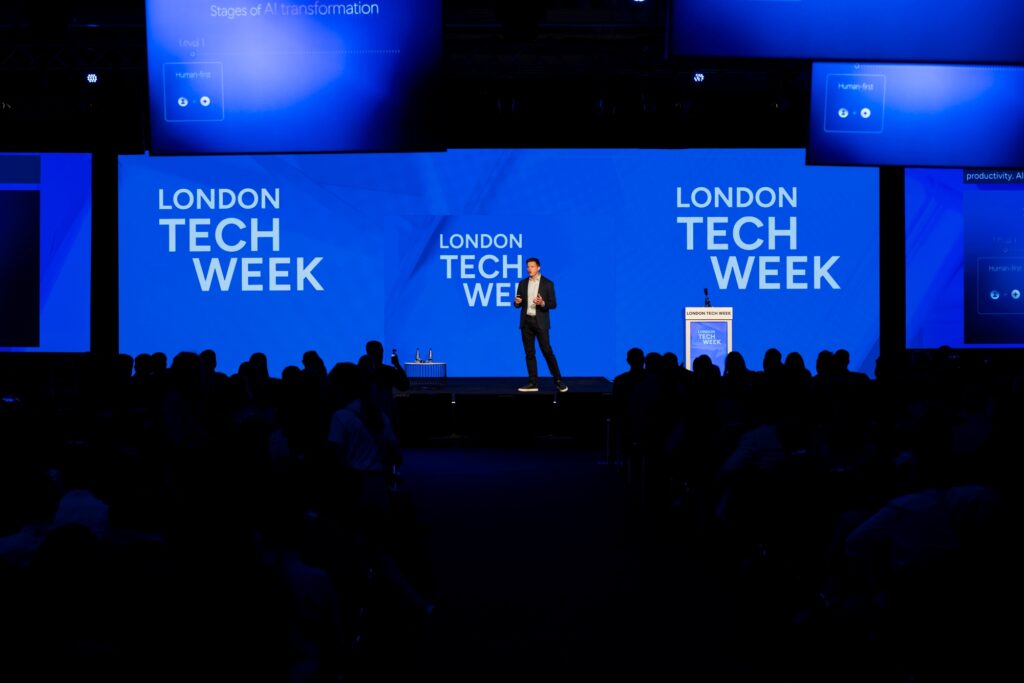
‘AI is the defining opportunity of our generation’
On the first day of London Tech Week, held at Kensington’s cavernous Olympia hall in London, a strong theme emerged: the UK is a world leader in AI, but it needs to continue building the infrastructure to support this paradigm-shift in technology, and ensure its people have the skills to maximise its potential.
In his keynote speech, Darren Hardman, CEO, Microsoft UK, cited research forecasting a £550bn boost to the UK economy by 2030 if the country fully embraced AI across public and private sectors.
He emphasised Microsoft’s commitment to building the datacentres needed to power the UK’s AI economy. And he welcomed the Government’s new commitment – announced by Prime Minister Sir Keir Starmer earlier – to train 7.5 million in AI skills by 2030 in partnership with Microsoft and 10 other companies.

Microsoft is already committed to giving a million people AI skills by the end of 2025, he said, as he encouraged the audience to make the most of the company’s many free training resources.
“Talent – not just technology – will decide which nations lead in the AI era,” he said.
Investment magnet
Carolyn Dawson OBE, CEO of London Tech Week co-organiser Founders Forum Group, told the packed main-stage hall that the UK’s 17,000 venture capital-backed tech start-ups were now worth $1.2 trillion, such was the confidence investors had in the country’s record of tech innovation.

Prime Minister Sir Keir Starmer observed that the UK’s tech sector supported two million jobs and was growing 30 times faster than the rest of the economy, while announcing a raft of measures designed to maintain the UK’s leadership position in AI:
- £1bn investment to scale up compute power by “a factor of 20”
- More digitisation and automation of Government processes and services
- Streamlining of planning processes to speed up datacentre building
- £187m investment in a tech-first AI skills training programme for young people in schools and universities.

And taking part in a panel discussion with Sir Keir and Poppy Gustafsson, Minister of State for Investment, an enthusiastic Jensen Huang, CEO, NVIDIA, built on the investment theme, saying: “The UK is a great place to invest…you’re the envy of the world! We’re going to invest here.”
He encouraged the UK to continue building more AI infrastructure so that it could cement its global AI leadership position and capitalise on the huge appetite for venture capital investment
“Get on board the AI rocket ship” and ride the accelerating pace of change, he advised.
Agentic era
Hardman described AI as the “the defining opportunity of our generation” that was “fundamentally transforming how we work, how we live, and how we dream – on an unprecedented scale.”
Businesses big and small were embracing generative AI and AI agents, to boost productivity, but also to remove much of the digital drudgery that prevents workers from being more creative, innovative, and effective, he said.
For example, financial services giant Barclays was a “beacon of innovation” for rolling out Microsoft 365 Copilot licenses to 100,000 employees worldwide, while the NHS was also “leading the charge with AI” and using the tech to free up clinicians to spend more time with patients.

Agentic AI, the next stage on from simple generative AI, is enabling organisations to automate many processes and drive efficiencies throughout their operations, Hardman said.
“Agentic AI is like giving every employee a brilliant teammate – 24/7, tireless, and focused.”
Elsewhere at the event, Microsoft’s Amanda Sleight, General Manager, Public Sector, cited the example of Job Centre Work Coaches using Microsoft 365 Copilot to help write CVs and career plans for jobseekers in a fraction of the time it would normally take them.

This was a “huge opportunity” to help people back into work, she said, with Andrew Western, MP, Parliamentary Undersecretary of State at the Department for Work and Pensions nodding in agreement next to her.
Customer zero
Microsoft’s “Customer Zero” approach, which means being the first to test the technologies it develops, has resulted in about 40% of all Microsoft code now being written by GitHub Copilot, Hardman said, “enabling us to launch more products in the last 12 months than in the previous three years.”
Developers were being freed to write better code and be more imaginative in what they create, he said, and “when developers thrive, innovation accelerates. And when innovation accelerates, entire industries and nations move forward.”

The Customer Zero approach was integral to building trust with customers, he argued, an essential factor when data security and cybersecurity are at the top of most organisations’ agendas.
“Trust and innovation are the twin pillars of Microsoft’s culture,” he concluded. “We want Microsoft to be your trusted partner on this AI journey.”
Human-centred AI

Another theme of the day was that AI should not be seen as a threat to jobs, but as an enabler of more fulfilling work that adds more value to organisations, whether in the public or private sectors.
As Sir Keir Starmer said: “AI and tech make us more human,” because they remove the mundane and free people up to offer customers more empathetic, human-centred service.
And NIVIDIA’s Huang argued that, thanks to generative AI’s more intuitive natural language interface, AI has become “the great equaliser”, with complex computing capability now available to everyone.
Hardman concluded: “These tools must be secure, inclusive, and support human potential – not replace it.”

